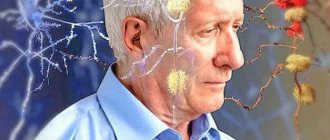Overly suspicious and sensitive people suffer from hypochondriacal disorder. They constantly feel like they are sick with something, although their health is not in danger. This article will help you find out what hypochondria is and how to get rid of it.
Hypochondria - what is it?
Hypochondria is a fairly common mental disorder in which a person suffers from a fictitious illness. It seems to him that some organ is not functioning properly and his health is critical. Even a therapist fails to convince such a “patient”. The treatment of hypochondriacs, that is, people who invent non-existent diseases, should be treated by a psychotherapist or psychiatrist.
Both men and women suffer from hypochondria. Often hypochondriacal disorder becomes chronic. Hypochondriacs are always looking for signs of various diseases, based on information from newspapers and magazines or from the Internet.
So who is a hypochondriac? First of all, he is a very suspicious and sensitive person. He feels like he has a bad heart. Several times a day he measures his pulse. He perceives headaches as nothing other than brain cancer. Any discharge from the genitals seems to him to be signs of a venereal disease. Hypochondriacs love to talk about the environment, often talk about their well-being, and are very concerned about the quality of their diet.
Symptoms of hypochondria
People suffering from hypochondria first “find” some terrible disease in themselves, then they try to convince the therapist of the existence of the found disease. They describe the signs of a disease of one organ, supplementing their narrative with more and more new “facts”. Sometimes hypochondriacs change the severity of their own illness. If, after several attempts to prove to a specialist the existence of, for example, stomach cancer, they fail, then the disease acquires a new name - stomach ulcer.
What organs or systems are affected by hypochondria, the symptoms and treatment of which hypochondriacs try to impose on health care workers? Typically, people suffering from this disorder complain of impaired functioning of the cardiovascular, genitourinary systems, digestive organs, and brain. A hypochondriac, that is, a person who invents illnesses for himself, may imagine that he has cancer, AIDS, or a severe form of hepatitis.
A person speaks confidently about his illness. If a medical worker tries to dissuade such a “patient,” he may encounter resistance or a negative, aggressive reaction. Despite the “convincing” facts, the signs of a hypochondriac’s illnesses often do not fit into the clinical picture of the illness he describes. But all the symptoms of hypochondria are present.
Hypochondriacal disorder - signs:
- feeling of numbness, crawling all over the body;
- frequently occurring pain not associated with any pathology;
- general malaise.
Such people are in a constant state of anxiety and searching for some kind of disease. Obsessive fear is the hallmark of this mental disorder. Having “found” any disease in themselves, hypochondriacs begin to look for all kinds of information about its treatment. In addition to the imaginary illness, hypochondriacs sometimes begin to talk all sorts of nonsense, their thoughts resemble delirium, which gives them the right to diagnose them with schizophrenia.
Hypochondria affects the nature of a person’s relationships with the people around him. He becomes selfish and too touchy. Completely concentrates on his experiences and “pains.” If loved ones do not react to his illness in any way, the hypochondriac considers them callous and indifferent people. The range of interests narrows - those suffering from a mental disorder worry only about their own health and nothing else.
Prehypochondriacal state
The tendency to identify various diseases in oneself can arise against the background of a depressive state or after psychological trauma. If a person’s relative has died, for example, from cancer, then he may soon begin to look for signs of cancer in his body. He will constantly listen to pain and perceive any changes in the functioning of organs as signs of an incipient illness.
The development of a pre-hypochondriacal state can be affected by taking medications and stress. With age, the tendency to hypochondria only increases. Melancholic people love to invent various illnesses for themselves. Sometimes the disease occurs even in explosive and hot-tempered choleric people.
Senesthopathy in hypochondria
Many patients with hypochondria have senestopathies. Attention is focused on painful sensations occurring inside the body. A person associates such sensations with signs of a progressive disease. Initially, he complains of indigestion, constipation, and nausea. Then the pain is localized in one place - in the heart, head, stomach.
Guided by their own guesses, such people go from one doctor to another, trying to identify a serious illness. If specialists do not find anything, they continue to assure everyone that they are right and treat themselves.
How does hypochondria manifest in depression?
Hypochondriacs may suffer from depressive disorder. They become suspicious, apathetic, and overly exaggerate the severity of their illness. For example, an ordinary headache is perceived as brain cancer. Having convinced himself of an incurable disease, the hypochondriac is in a depressed mood, is not interested in anything, and is confident that death is approaching soon. He loses his appetite, insomnia and digestive problems appear.
Causes of hypochondriacal disorder
What are the causes of hypochondria, and how does the mental disorder develop? The fact is that the disease is influenced by a number of factors: frequent stress, bad habits, unfavorable environment, poor nutrition, hereditary predisposition, hormonal imbalances. A person’s psyche becomes depleted, he becomes suspicious and vulnerable, and invents various non-existent diseases for himself.
Another cause of hypochondriacal disorder comes from childhood. If a child was often sick, then even in adult life he retained the position of a sick person. He will constantly listen to his own body, perceiving neutral signals as pathological. A person is convinced of the weakness of his own body and is constantly looking for some kind of disease.
Psychologists consider hypochondria to be a person’s inability to get sick and an acute fear of death. If you tell a patient that he has a serious and incurable disease, then he will perceive the real pathology as an unimportant fact.
Types and forms of hypochondria
There are 2 forms of hypochondria:
- Sensoipochondria. The syndrome is characterized by acute pain. A person self-treats using alternative medicine. The hypochondriac is sure that his condition is getting worse, even after a medical examination.
- Ideoipochondria. A person is afraid of “catching” an infection. Constantly takes tests and conducts examinations. The individual is haunted by the thought that he has a serious illness occurring in a latent phase.
Types of hypochondria:
- Obsessive.
It occurs due to frequent stressful situations and is the result of excessive emotionality. The disorder is detected in suspicious people with a rich imagination. A person is very worried about his health.
- Super valuable.
Exaggerated concern for health. An individual tries to lead a healthy lifestyle, eat healthy food, is afraid of infections and spends a lot of time on disease prevention.
- Delusional.
A person sees some kind of threat even in the most harmless things. It seems to him that the therapist is deliberately hiding the real diagnosis from him. A hypochondriac may think that he has cancer because he lives in a house made of building materials irradiated by radiation.
How does hypochondria manifest?
The mental disorder in question can act either as an independent disease or as part of more complex mental disorders. In the case of a severe form of this illness, the presence of conviction in the fact of the presence of incurable diseases cannot be “broken” with the help of criticism or correction. Most hypochondriacs believe that they have incurable diseases and cancer. Patients attribute to themselves the symptoms of AIDS, HIV and other diseases that are transmitted through sexual contact.
Hypochondriacal syndrome is quite common these days. According to statistics provided by researchers of this disease, the prevalence rate of hypochondria ranges from three to fourteen percent. Some patients, when visiting a doctor, often exaggerate the severity of the clinical picture. However, during a diagnostic examination, the presence of the disease is refuted. According to experts, the development of this disease is associated with the presence of a personal predisposition . Most often, various mental disorders are diagnosed in people with low self-esteem, suffering from obsessions and suspiciousness. It is from these symptoms that the disease in question originates.
There are two forms of this disease:
- Sensoipochondria - this syndrome develops with a feeling of acute pain or other unusual sensations. In order to put his well-being in order, the patient begins to independently use various methods of traditional and folk medicine on himself. Despite the fact that diagnostics reveal the absence of serious diseases, patients constantly say that their condition is significantly worsening.
- Ideoipochondria - the development of this form of the disease begins with the idea that there is a high risk of “catching” an infection. Gradually, this idea develops, and anxious thoughts intensify. This leads to the patient constantly visiting various clinics and undergoing the most expensive examination methods. The thought that he has a complex disease that occurs in a latent form haunts the person. Over time, all his thoughts revolve only around his own health, and the rest of his life is relegated to the background.
Hypochondria is a disorder that affects both men and women after 35-40 years of age.
Diagnosis of the disorder
Only a specialist has the right to diagnose a person suffering from hypochondriacal disorder. First you need to come to the clinic and be examined by a therapist, gastroenterologist, cardiologist, or oncologist. Be sure to take blood tests, urine tests, and x-rays. Be examined by ultrasound, ECG, MRI. After excluding any pathology, the hypochondriac will be referred to a psychologist or psychiatrist.
How is hypochondria different from obsessive-compulsive disorder?
Obsessive-compulsive disorder causes obsessive thoughts and groundless fears. To overcome feelings of anxiety, a person takes some action. For example, fearing infection, he washes his hands several times a day. He constantly lives in fear, waits for trouble, takes too many actions to fight an imaginary disease. This disease differs from hypochondria in its symptoms (unfounded fears, obsessive need for rituals) and in its more severe form.
Test for hypochondria
Those who want to find out how close they are to the point of crisis can take a test for hypochondria. Similar tests can be found on the Internet. In them, people being tested are asked to answer a series of questions, many of which touch on the topic of medications, treatment, and attitudes towards their own health. The test can be taken anonymously and without registering on the site. After the test taker answers all the questions, his answers are immediately processed and after a couple of seconds you can get the finished result.
Hypochondriac - definition
A hypochondriac is a person suffering from somatoform disorders, that is, suffering from illnesses and having symptoms of diseases that have no basis for his health. A person suffering from hypochondriacal disorder may believe that they have an illness and “induce” its symptoms and physical ailments.
Hypochondria is a serious condition that is classified as severe obsessive-compulsive disorder. A person suffering from this disease lives in constant fear for his health, which, in turn, generates severe stress, which weakens the body and can contribute to the actual formation of diseases.
Hypochondriacal neurosis has different stages - from persistent to cyclical. The latter can be manifested either by excessive curiosity of doctors when making a diagnosis or by underestimation of a potential problem. A hypochondriac cannot control his panic fear for his health and life, even if he has evidence that he is healthy.
How to treat hypochondria?
Depending on the severity of the disease, treatment for hypochondria is carried out on an outpatient basis or in a hospital. The main method that relieves a person from this mental disorder is psychotherapy. Correction of erroneous attitudes and beliefs is carried out. In the process of treating hypochondria, Gestalt therapy and psychoanalysis are used. The psychotherapist talks with the client, trying to find out the causes of the disorder and change his psychological attitudes.
In order to get rid of obsessive thoughts about non-existent diseases, it is advisable to seek help from psychologist-hypnologist Nikita Valerievich Baturin. Perhaps all family members will need help. The psychologist will find an approach to each client and will be able to apply family therapy for hypochondria in practice.
Hypochondria Test - Check if you have hypochondria symptoms
A hypochondriac is a person with a condition that is difficult to diagnose. This can be both a sign of changes in the psyche and serious illnesses. However, there are some symptoms that may indicate a hypochondriac. Using the test we have prepared, you can check whether the problem of hypochondriacal neurosis affects you.
If you answered yes to at least 4 questions, this is a sign that you may have hypochondria. To rule out other ailments, you should first visit a doctor and carry out all the basic tests. After ruling out physical causes, you should seek help from a specialist - a psychologist or therapist who specializes in the treatment of neuroses and hypochondria.
Hypochondria - how to get rid of it yourself?
Relatives and friends of people suffering from hypochondriasis often ask: how to get rid of hypochondria? Is it possible to help such a patient at home?
The fact is that without special training and knowledge it is impossible to cure a hypochondriac. If you tell him that he is not sick and all his illnesses are just a figment of his imagination, he will be offended. If you agree with him, then the person will “wind up” himself even more.
The best way out is to make him go to a psychotherapist under any pretext. You can imagine exactly the same illness as a hypochondriac and ask him to be with you during a visit to a psychologist. It is important to constantly draw parallels between your fictional diseases and the symptoms of hypochondriac diseases.
Hypochondriacal disorder can develop into a serious mental illness at any time. It will be even more difficult to get out of the crisis. It is advisable to begin treatment for hypochondria when the initial signs of the disease appear.
Hypochondria - symptoms and treatment
Like any other disease, hypochondria has its own symptoms, which determine the treatment methods used taking into account the psychophysical state of the patient and his individual characteristics. A long-term illness can cause hypochondriacal disorders, aggravating the general depressed state, increasing suspiciousness and anxiety.
Hypochondria - symptoms
Even the possibility of getting sick causes constant anxiety in a hypochondriac. He may claim that he knows what he is sick with, but this conviction is constantly changing, since the “sick” discovers signs of one or another illness. If concerns concern the heart, gastrointestinal tract, brain or reproductive organs, then doctors believe that they are faced with pure hypochondria. The disease has the following symptoms:
- complaints of poor health in the absence of problems;
- perception of an ordinary health condition as painful;
- confidence in the presence of incurable diseases;
- the inability to convince the patient that there is no deadly disease;
- in especially severe cases – suicide attempts, hallucinations.
Hypochondria - treatment
Treatment of hypochondria presents a certain difficulty, since hypochondriacs usually do not associate the existing ailment with their mental state, but perceive it as a result of the action of a disease they have invented, the symptoms of which they feel and even know how to treat. However, despite the difficulty of communicating with a hypochondriac, the disease is treatable. At the same time, a psychiatrist and psychotherapist can determine how to treat hypochondria, and the main goal is to change thoughts and behavioral habits.
Hypochondria - how to get rid of it yourself?
Doctors say that you can cure the disease on your own if you strictly follow the recommendations of a specialist, and drug treatment may not even be necessary. To do this, it is enough to know the methods and techniques that allow you to understand how to get rid of hypochondria on your own, and apply them in practice, but always under control. The most effective are:
- work to eliminate fears;
- overcoming social isolation, determining one’s place in society;
- increased self-esteem;
- practical consolidation of positive qualities and skills;
- keeping a diary with mastering the ability to analyze records;
- art therapy techniques;
- breathing exercises;
- relaxation;
- yoga.
Traditional methods of treatment
With hypochondria, a person falls into a manic state. Constantly waiting for the development of a serious illness. If you want to help a hypochondriac, you need to convince him that dark thoughts can come true. If he looks for some kind of disease, he will definitely get sick.
During times of crisis, it is recommended to take decoctions and tinctures of herbs (chamomile, mint, lemon balm, valerian, motherwort). Herbal tea is an excellent sedative. You can make a bath with the addition of a decoction of medicinal herbs or pine needles. A contrast shower or cold douche perfectly relieves hypochondria. Before going to bed, you can drink a glass of warm milk with honey.
How to get rid of suspiciousness?
Too suspicious people try on every disease. It seems to them that they have exactly the disease that they accidentally (on purpose) read about on the Internet. How to get rid of this condition? First of all, you need to go to the clinic, get all the tests done and make sure that there is no reason to worry.
If thoughts about the development of the disease are still repeated, then it’s all about mental health. You can normalize your mental balance if you seek help from a psychotherapist. You can switch your attention to a new, interesting thing. For example, sign up for swimming, get interested in drawing, gardening. For any psychological disorder, healthy sleep, good nutrition, walks in the fresh air, and a calm lifestyle help.
How to live with a hypochondriac?
Hypochondriacs are called imaginary patients. Such people constantly complain of feeling unwell and unwell. Psychologists say that hypochondria occurs in people suffering from loneliness. They specifically complain about their health in order to win the attention of their relatives, and then manipulate them.
In such a situation, you need to behave patiently. Under no circumstances should you try to convince a person that he is wrong or ridicule an imaginary illness. You just need to distract him with some new, more interesting activity. Older people can be encouraged to take up gardening or gardening, while young people can find a hobby, go on a trip, or play sports. The main thing is to switch attention to another object during illness.
Hypochondria - reasons
In ordinary life, it is generally accepted that hypochondria occurs against a background of melancholy and depression. However, there are many more reasons for its appearance. It is believed that emotional, vulnerable, impressionable natures are more susceptible to the disease than others. Among hypochondriacs, the majority are elderly people, especially suspicious and worried about their health, although there are teenagers and people of other ages. The main causes of hypochondria are:
- constant anxiety and depression;
- persistent fears and neuroses;
- hypertrophied suspiciousness;
- reluctance to accept your age (many older people);
- communication problems;
- chronic severe diseases;
- frequent illnesses in childhood, causing increased anxiety among parents;
- failures in sexual terms.
A person suffering from this disease may experience attacks of hypochondria against the background of developing neuroses and depression, cancer, schizophrenic seizures and even the common cold. In this case, doctors take measures to treat the identified disease and reduce the destructive effects of traumatic situations.









